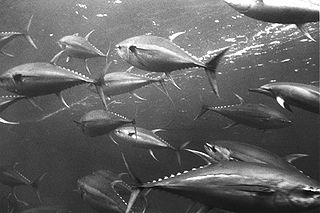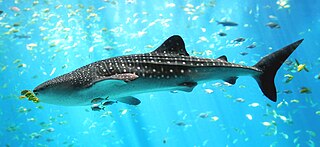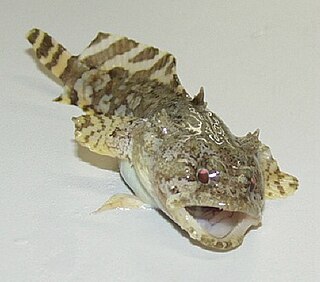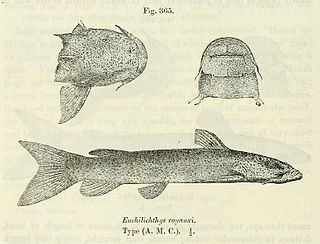
A tuna is a saltwater fish that belongs to the tribe Thunnini, a subgrouping of the Scombridae (mackerel) family. The Thunnini comprise 15 species across five genera, the sizes of which vary greatly, ranging from the bullet tuna up to the Atlantic bluefin tuna. The Atlantic bluefin averages 2 m (6.6 ft), and is believed to live up to 50 years.

The mackerel, tuna, and bonito family, Scombridae, includes many of the most important and familiar food fishes. The family consists of 51 species in 15 genera and two subfamilies. All species are in the subfamily Scombrinae, except the butterfly kingfish, which is the sole member of subfamily Gasterochismatinae.

Characidae, the characids or characins is a family of freshwater subtropical and tropical fish, belonging to the order Characiformes. The name "characins" is the historical one, but scientists today tend to prefer "characids" to reflect their status as a by and large monophyletic group at family rank. To arrive there, this family has undergone much systematic and taxonomic change. Among those fishes that remain in the Characidae for the time being are the tetras, comprising the very similar genera Hemigrammus and Hyphessobrycon, as well as a few related forms such as the cave and neon tetras. Fish of this family are important as food and also include popular aquarium fish species.

Minnow is the common name for a number of species of small freshwater fish, belonging to several genera of the family Cyprinidae. They are also known in Ireland as pinkeens.

The Squaliformes are an order of sharks that includes about 126 species in seven families.

The electric rays are a group of rays, flattened cartilaginous fish with enlarged pectoral fins, composing the order Torpediniformes. They are known for being capable of producing an electric discharge, ranging from 8 to 220 volts, depending on species, used to stun prey and for defense. There are 69 species in four families.

Carpet sharks are sharks classified in the order Orectolobiformes. Sometimes the common name "carpet shark" is used interchangeably with "wobbegong", which is the common name of sharks in the family Orectolobidae. Carpet sharks have five gill slits, two spineless dorsal fins, and a small mouth that does not extend past the eyes. Many species have barbels.

Batrachoididae is the only family in the ray-finned fish order Batrachoidiformes. Members of this family are usually called toadfish, or "frogfish": both the English common name and scientific name refer to their toad-like appearance.

The Mochokidae are a family of catfishes that are known as the squeakers and upside-down catfish. There are nine genera and about 200 species of mochokids. All the mochokids are freshwater species originating from Africa.

Nettastomatidae, the duckbill eels or witch eels are a family of eels. The name is from Greek netta meaning "duck" and stoma meaning "mouth".
In fishes, a suckermouth is a ventrally-oriented (inferior) mouth adapted for grazing on algae and small organisms that grow on submerged objects.

Pangasius is a genus of medium-large to very large shark catfishes native to fresh water in South and Southeast Asia. The term "pangasius" is sometimes used to specifically refer to the commercially important basa fish, P. bocourti.

Zaniolepis is a genus of scorpaeniform fish native to the eastern Pacific Ocean. Z. frenata is known to have been a source of food to the Native American inhabitants of San Nicolas Island off the coast of southern California, United States during the Middle Holocene.
Euchilichthys astatodon is a species of upside-down catfish native to Angola and the Democratic Republic of the Congo where it occurs in the Kasai River drainage. This species grows to a length of 18.5 centimetres (7.3 in) TL.
Euchilichthys boulengeri is a species of upside-down catfish endemic to the Democratic Republic of the Congo where it is found in the Lulua River near Kananga. This species grows to a length of 9.7 centimetres (3.8 in) TL.
Euchilichthys dybowskii is a species of upside-down catfish native to Cameroon, Central African Republic and the Democratic Republic of the Congo where it is found in the Dja and Ubangi Rivers and rivers of the eastern Congo Basin. This species grows to a length of 11.2 centimetres (4.4 in) TL.

Euchilichthys guentheri is a species of upside-down catfish native to the Congo Basin of the Democratic Republic of the Congo, the Republic of the Congo and Zambia. This species grows to a length of 19 centimetres (7.5 in) TL.

Euchilichthys royauxi is a species of upside-down catfish native to the Congo Basin of Angola, Cameroon, the Democratic Republic of the Congo and Zambia. This species grows to a length of 22 centimetres (8.7 in) TL. Euchilichthys royauxi was named by George Albert Boulenger in 1902 from specimens taken in the Ubangi, its specific name royauxi is in honor of the Belgian officer Louis Joseph Royaux who led the expedition that collected the type specimen.

The Catostomidae are the suckers of the order Cypriniformes, with about 78 species in this family of freshwater fishes. The Catostomidae are almost exclusively native to North America. The only exceptions are Catostomus catostomus, found in both North America and Russia, and Myxocyprinus asiaticus found only in China. In the Ozarks they are a common food fish and a festival is held each year to celebrate them. Ictiobus cyprinellus can reach an age up to 112 years, making it the oldest known freshwater teleost.
The Nemacheilidae, or stone loaches, are a family of cypriniform fishes that inhabit stream environments, mostly in Eurasia, with one genus, Afronemacheilus found in Africa. The family includes about 630 species.















